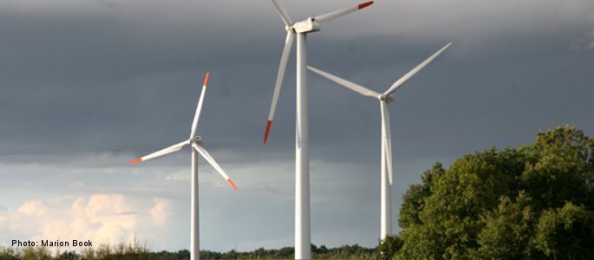The German Energiewende – Our Contribution to a Sustainable Energy System
People around the world are observing the progress being made by Germany on its energy reforms (known as the “Energiewende”), which are no less than a complete overhaul of its energy supply system, entailing the phase-out of nuclear energy, a reduced reliance on fossil fuels, the promotion of energy efficiency, and the establishment of renewable energies as the main sources of energy. The reforms will make our country less dependent on fossil fuel imports, are key in allowing Germany to make an appropriate contribution to combating climate change, and will stimulate new growth in sectors that offer significant potential for new jobs. Ultimately, the Energiewende will be a true success if other countries embark on a similar path of decarbonizing their energy supplies. This is why the dialogue with our neighbors in Europe and our partner countries internationally is of greatest importance to us.
Transforming our energy system is a challenging task. Germany’s electricity system has always boasted one of the highest security-of-supply standards worldwide. German households and companies rarely – if ever – experience a blackout. It is crucial to maintain this high standard, since it forms the backbone of our success as a society that generates its prosperity to a great extent through developing, producing, and exporting high-quality goods. The cost of electricity has recently been rising due to the funding of renewables. We need to stabilize the energy costs for households and industry in order to maintain the general acceptance of the Energiewende and the competitiveness of our economy. I believe that it is our obligation as an industrialized country to protect our manufacturing base, and at the same time decarbonize our energy system.
The good news for other industrialized countries is that they can embark on their own energy reforms at a time when a mature global renewable-energy industry is already in place. Germany and other first-movers are financing the learning curves for solar and wind technology. In the first phase of the energy reforms between 2000 and today, the average level of funding for all renewable-energy technologies was about €17 cents/kWh. This support has boosted the share of renewables in electricity production from 6 percent in 2000 to 25 percent in 2013. Now that we are entering a second phase, in which renewable energies will become the “leading systems” within the power supply, renewables have to – and can – compete with conventional generators. In 2015, the average funding level for renewables will fall to around €12 cents/kWh and will be further reduced over the coming years. It is a great achievement that we have seen the costs for renewables such as photovoltaics coming down in a much shorter time period than expected.
In my capacity as Minister for Economic Affairs and Energy, I have proposed binding corridors for the expansion of renewables, in which the support levels will be adjusted according to the additions of the previous year. This will guarantee a steady reduction in costs and allow us to better plan the necessary adjustments in the grid and in the market design to complement renewables. By doing this, Germany is stressing its commitment to the transition toward renewable energies and to achieving our targets of 40 to 45 percent of electricity production by 2025 and 55 to 60 percent by 2035, while simultaneously enhancing cost-efficiency.
Nevertheless, the transition to renewables creates new challenges. Synchronizing power supply and demand is becoming more complicated due to the volatile nature of renewables. We need to find a new market design that fits the requirements of an energy system with a greater variety of technologies and market participants. In the long run, we also need to find ways to store electricity efficiently. In this process, we want to cooperate with other countries in order to find the most effective solutions soon.
What can other industrialized countries learn from the first phase of the German Energiewende? The key aspect of the successful establishment of a renewable-energy industry in Germany was the long-term investment security, which our feed-in tariff system provided to facilitate the market launch. With investment security in place, new entrepreneurs and established companies will innovate and bring down costs. A second key aspect is to push for innovation by exposing renewables gradually to market conditions and to provide incentives for the integration with conventional generation.
Engaging citizens in determining the energy pathway for the future is a third key requirement: It was only possible to providing a sound political and regulatory framework for the integration of renewables because the German people strongly support the energy reforms. We believe that the renewables industry will be one of the growth industries of the future. The sector has already created around 380,000 jobs in Germany, and the potential to scale product development and production is great. Thinkers such as Jeremy Rifkin believe that renewable energies – in concert with modern information technologies – will trigger the next industrial revolution. It is my belief that the German Energiewende can indeed serve as a model for other industrialized countries, showing them how to prepare their economies for the coming era of sustainable growth.
Sigmar
Gabriel is Vice-Chancellor of the German Government and Federal Minister for
Economic Affairs and Energy.
About Us // Privacy Policy // Copyright Information // Legal Disclaimer // Contact
Copyright © 2012-2018 macondo publishing GmbH. All rights reserved.
The CSR Academy is an independent learning platform of the macondo publishing group.









